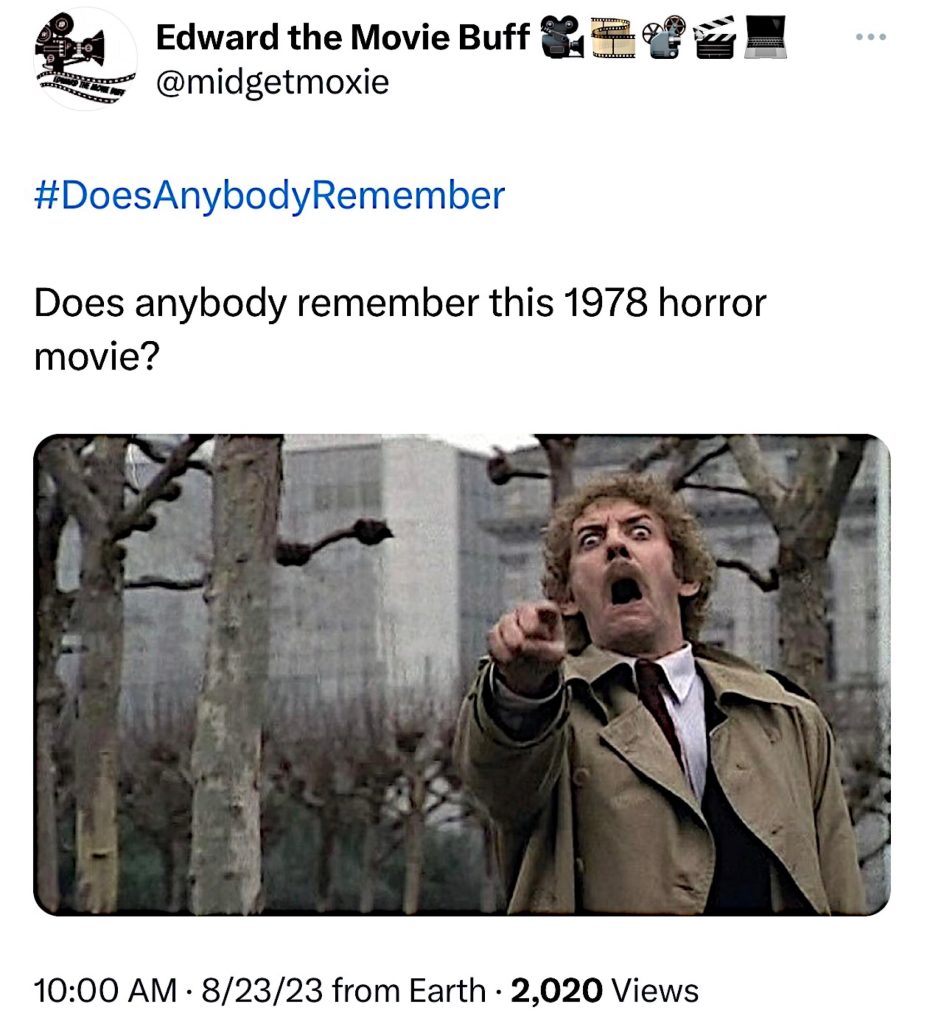

In yesterday’s “Late To This…Brilliant” post, I responded to an exciting montage of scenes from several Martin Scorsese films, and more particularly to a clip from a black-and-white sex scene from Scorsese’s Who’s That Knocking At My Door?” (’68) — his first feature film.
It featured Harvey Keitel, of course. I wasn’t certain if costar Zina Bethune was part of it, but I thought she might be.
A guy I described as helpful (in this instance) friendo explained the basics:
“Yes, it’s Who’s That Knocking, and it’s NOT Zina Bethune, who was a nice girl who didn’t do nudity.
“The sex scene — a dream sequence — was shot in Amsterdam with Keitel and a series of European model/actresses.
“It was added because a would-be distributor in the United States agreed to pick up the movie but only if it had a nude scene that could give it grind house appeal.
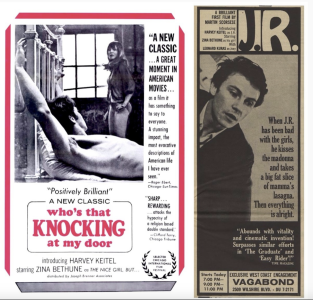
“Scorsese was up to something in Paris at the time, got the funds from the would be distributor, had Keitel fly to Europe, tried to work the actor’s hair into an approximation of what it looked like when they shot the rest of the film, and concocted the sequence. For some reason Amsterdam was more viable than Paris at the time.
“Scorsese actually was so scared about running afoul of customs that he hid the reel like contraband when he left for the States.”
HE responds: Fascinating recap but I have questions. Scorsese presumably didn’t meet the Brooklyn-based distributor, Joseph Brenner (who was always looking to exploit sexual content in films, and whose company was either called Joseph Bremer Associates or Medford Film Distribution) in Paris. Why would he encounter Brenner way the hell over there?
Why Scorsese decided to fly Keitel to Amsterdam for the filming of the sexual dream sequence is a total mystery, but from our 2023 perspective it seems that if the pure-of-heart Zina Bethune (whose character obviously would and should have been a significant presence in the sexual fantasies of Keitel’s character)…if Bethune wasn’t such a conservative, no-nudity prude, the dream sequence could have been filmed in a lower Manhattan loft for a small fraction of the cost of the Amsterdam shoot. (No air fare or hotel bills, for one thing.)
Okay, I am judging somewhat. I’m sharing a certain observational concern about the ahistorical S&M (B&D?) lipstick labeling on Vanessa Kirby’s neck.
This just-released teaser poster for Ridley Scott’s Napoleon (Apple/Sony, 11.22) is obviously aimed at the you-go-girl crowd. Oh, to have been an irreverent queen of France, guided by whim and smothered in early 19th Century luxury!, etc.
But the lipstick also tells me that Scott’s film may be tilting a bit more toward the aesthetic styling of Sofia Coppola’s Marie Antoinette and less in the highly scrupulous manner of Stanley Kubrick’s Barry Lyndon.
Or maybe the marketing has nothing to do with the film at all. Who knows?
The Duellists-era Ridley was a classicist, but maybe he’s decided to adapt to new ways of thinking?

Or should I say “skating on thin ice”? Or simply “in trouble”?
Anyway you slice it, Toronto Int’l Film Festival honchos have reason to feel extremely unsettled this evening. The reason is that Bell, a major TIFF sponsor since 1995, “is set to end its long-standing sponsorship of TIFF,” according to the Toronto Star‘s Robert Benzie.
Benzie excerpt: “In a blow to the Toronto International Film Festival, the telecommunications and media giant is moving on after this year’s event, sources say.”
I mean, the illuminated words “TIFF Bell Lightbox” is right on the side of the main screening facility, for Chrissake. Now the festival will have to redesign and re-mount new building logos that say just “TIFF Lightbox” without the Bell.
The following passage from Benzie’s story is probably key: “Sources say Bell, which earlier this month announced that second-quarter earnings plunged about 40 per cent from one year ago, is scrambling to find savings and sponsorships are low-hanging fruit.”
Do I hear the word “gulp”?

What was the Anti-Defamation League doing when Schnozzgate first broke…sleeping? On vacation?
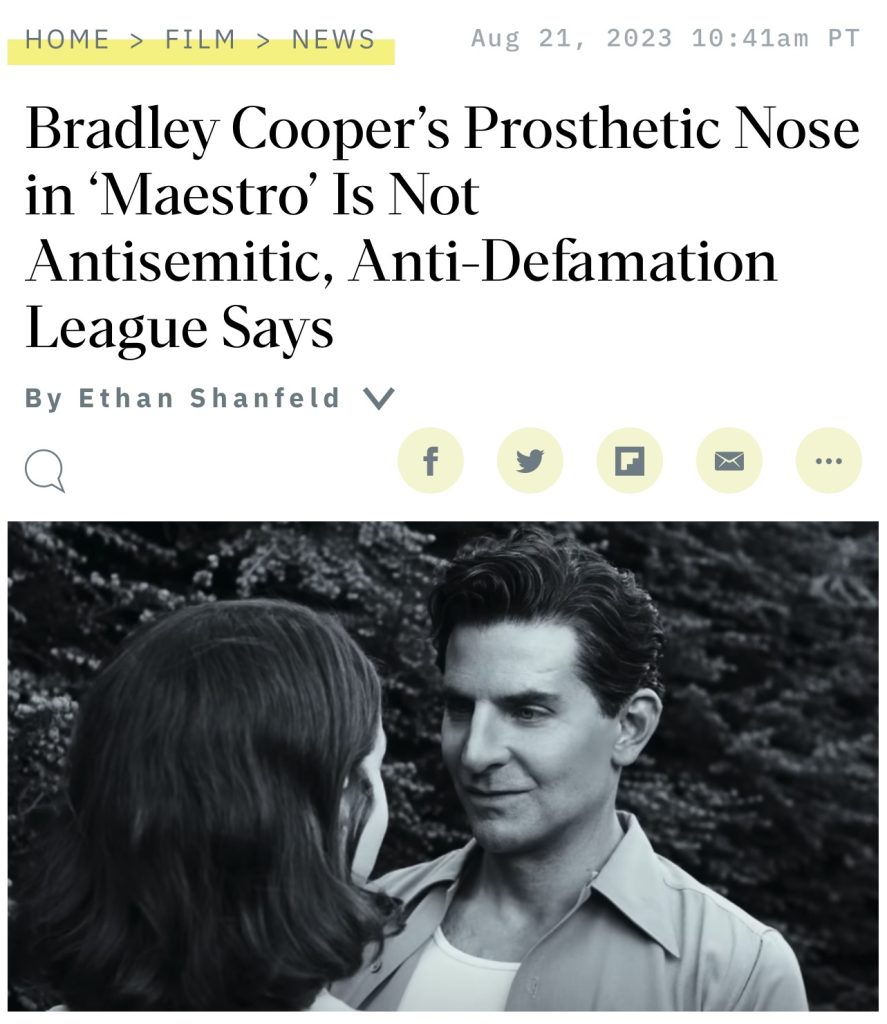
HE to anyone: The black-and-white sex scene at the very beginning….that’s from Who’s That Knocking At My Door?, right? The actors, I presume, are Harvey Keitel and the late Zina Bethune.
Friendo: The Asylum, the cheeesball, low-budget outfit which bears the primary responsibility for the Sharknado franchise, along with company honcho and Sharknado franchise director Anthony Ferrante, have been openly promoting the tenth anniversary of the film’s theatrical debut (7.11.13).
Friendo: “Asylum reps attended ComicCon in San Diego (7.20 to 7.23) despite many having dropped out, not giving a shit at all about the strike because both he and the company have never cared at all about unions or rights.
“It’s not widely remembered that Asylum hired a scab crew for the third Sharknado sequel. Not to mention David Hasselhoff and Michelle Bachman having crossed picket lines. In the current AMPTP-vs.-WGA negotiations majors are now acting like Asylum, which not only flaunted that scab crew while literally mocking IATSE. Ferrante has seemingly thumbed his nose at the strike left and right.
Friendo: “The WGA negotiating team has been problematic, but the AMPTP has taken a dismissive tone towards unions due to the more corporate-minded CEOs, particularly the regarding of talent, writers and actors as almost below-the-line now. That’s partly why IATSE has been so militant and supportive of above-the-line. From a brash corporate perspective everyone is below-the-line. That’s why actors walked — a rarity.
“General Hospital, a daytime soap, openly stated they’d hire scab writers in the interim.
“Streamers are not unlike Asylum in their attitudes. Asylum was just more open about it. It’s the same attitude that gets David Zaslav booed and Bob Iger ridiculed for their general hardball heartlessness.”
(WATCH) Ron Perlman doesn’t hold back anything when delivering his remarks to supporters at the National Day of Solidarity rally in Burbank today #SagAftraStrong pic.twitter.com/wNTGMy29qw
— Deadline Hollywood (@DEADLINE) August 22, 2023
…but I’ll take it.

Zoe Rose Bryant felt she need to take a break from Twitter/X, and then changed her mind or whatever. And then Eric Anderson said, more or less, “how can I miss you if you won’t go away?” And then ZRB got riled and Eric followed suit.
Slow news day.
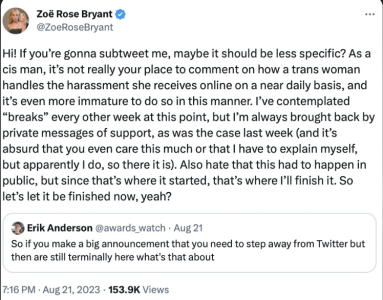
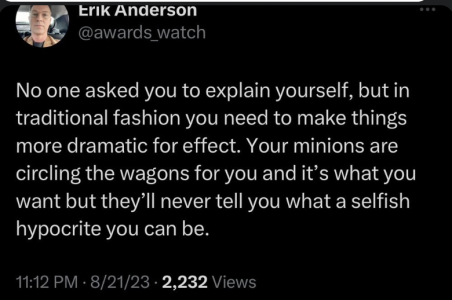
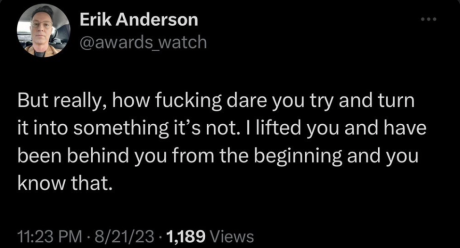
You can quibble with CNN’s Elie Honig about the ramifications of section 3 and the 14th Amendment, and about the “self-executing” aspect as well as which legal deliberative body could authoritatively declare that Donald Trump has in fact violated the section of the Constitution and is therefore ineligible to serve as U.S. President, but c’mon…the authors and supporters of the 14th Amendment (which was ratified in 1868) obviously had sociopathic rogue criminals like Trump in mind. Their intent couldn’t be clearer.
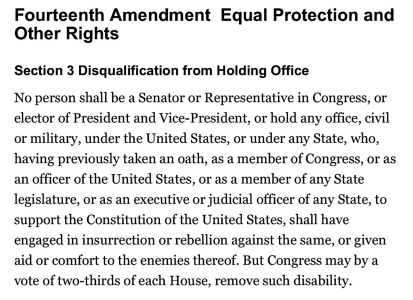
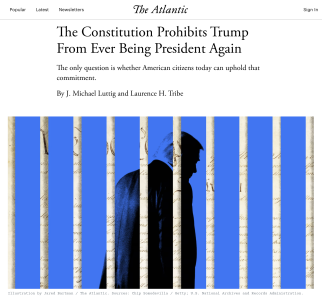
Martin Scorsese‘s Killers of the Flower Moon (Apple/Paramount, 10.6) isn’t going to the Telluride Film Festival. A 100% reliable source has just informed me of this. So that’s it — no prestige fall festival play at all. No Telluride, Toronto or New York.
Earlier today: If Killers of the Flower Moon doesn’t play the Telluride Film Festival, it’ll feel like a bit of a letdown, certainly among some of us. It’ll be like “so last May’s big Killers of the Flower Moon Cannes debut was it?”
This keenly anticipated, hugely expensive, epic-length Martin Scorsese film should benefit from at least one high-profile domestic festival screening between now and 10.6 (i.e., Telluride). If Killers sidesteps Julie Huntsinger’s Rocky Mountain gathering, it’s going to just…what, quietly slip into its two-week October theatrical run? No big domestic festival push for poor Lily Gladstone, the heir apparent for Best Supporting Actress?

Killers is a highly commendable period drama. Emotional impact-wise it may be a somewhat modest, middle-range effort at the end of the day, but the chops top to bottom — acting, production design, cinematography, musical score — are first-rate. I for one believed every minute of it…every last frame. It certainly deserves a big stateside festival push before the 10.6 theatrical opening.
Laurence Olivier’s Marcus Licinius Crassus to John Dall’s Marcus Glabrus, leader of the garrison of Rome, in Spartacus:
“But the public tribute is impossible. Leave tonight by unfrequented streets…without fanfare, without even a drum…sneak out.”
:Vigorous arguments! An exceptional episode…rough and tumble…not an easy schmoozer…”ooohh, not the right answer!”…”I think you’re running to be his vice-president”…”wow.”…”you’re such a personable guy, you’re so smart, but unless you soften on Trump, at least half the country…[the ones] who know that he’s an obnoxious criminal…they’re never going to accept you as the guy who can unite us…I can’t accept you as that.”
Maher to looney-tune lefties: “If you expect me to get on the crazy train with you, and if I don’t then I lose my liberal card….fuck you….you’re changing what liberalism is, not me.”